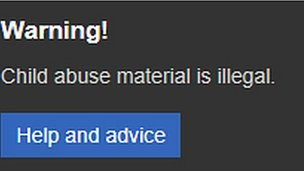Microsoft Introduces Child Abuse 'Pop-Up' Warning on Bing

Microsoft's Bing has become the first internet search engine to introduce a 'pop-up' warning for UK users attempting to access child abuse material online.
Triggered by a blacklist of search terms compiled by the Child Exploitation and Online Protection Centre (Ceop), the message will state that accessing child abuse material is illegal, and provide a link to a counselling service.
Microsoft said the notifications are designed "to stop those who may be drifting towards trying to find illegal child abuse content on the web via search engines".
A spokesman said: "This is in addition to Microsoft's existing and longstanding policy of removing any verified links to illegal content of this sort from Bing as quickly as possible.
"Microsoft has been, and remains, a strong proponent of proactive action in reasonable and scalable ways by the technology industry in the fight against technology-facilitated child exploitation. We have teams dedicated globally to abuse reporting on our services and the development of new innovations to combat child exploitation more broadly."
Last week, Prime Minister David Cameron warned internet companies that they needed to do more to stop the proliferation of child abuse imagery or face legal sanctions.
The increased government pressure follows the convictions of Stuart Hazell, for the murder of 12-year-old Tia Sharp, and Mark Bridger for the murder of four-year-old April Jones. Courts heard that both men had attempted to access paedophilic material online in the weeks leading up to the attacks.
Cameron has called for even stronger 'pop ups', warning those seeking child abuse material that they faces losing their jobs and access to their children, and has urged search engines to block all access to child abuse images.
Cameron's adviser Claire Perry MP today called on the Church of England to withdraw its investment from Google in order to help pressurise the company to block child abuse images.
Although Bing holds 4.99% of the search engine market and Google holds a massive 88.3% share, Microsoft's move places Google under increasing pressure to follow suit and introduce more pro-active anti-child abuse measures.
A Google spokesman said: "Child abuse imagery is illegal and we have a zero tolerance policy to it.
"We use purpose-built technology and work with child safety organisations like the Internet Watch Foundation to find, remove and report it, because we never want this material to appear in our search results.
"We are working with experts on effective ways to deter anyone tempted to look for this sickening material."
Charities and law enforcement officials have welcomed the move, but warned that much child abuse material is distributed on the so-called 'hidden internet', on networks such as Tor, in encrypted programmes so abusers can hide their identity.
Ceop deputy chief executive Andy Baker said: "This is a positive step in the right direction to deterring potential offenders from accessing indecent images of children on the internet. But it is a small, initial part of the solution to prevent child sexual abuse, protect children and pursue offenders.
"While the Bing project isn't the whole solution, I hope it goes some way to making those who are curious about searching for indecent images think again."
John Carr, from the Children's Charities' Coalition on Internet Safety, told the BBC: "To hardened technology-sophisticated technology-literate paedophiles, these pop-ups will probably make very little difference.
"But there is a very large number of men who perhaps have a marginal interest in this type of material and we need to stop them getting any further engaged with it."
Cameron also wants search engine giants to install a 'porn filter', compelling users to 'opt in' to access online adult material following concerns that children are able to access pornography too easily.
New figures obtained by the Guardian show the enormous popularity of the online pornography market, with 8.5% of all internet traffic in the country comprising clicks to legal pornography, with only search engines and arts and entertainment sites such as YouTube proving more popular.
© Copyright IBTimes 2025. All rights reserved.






















